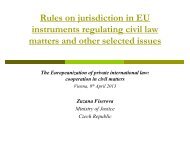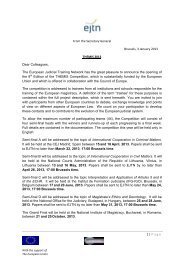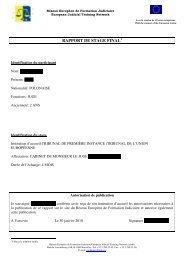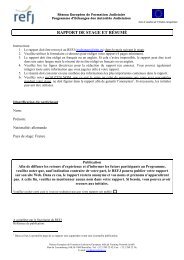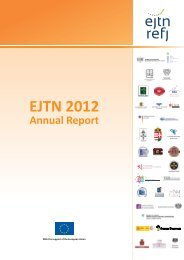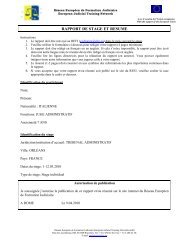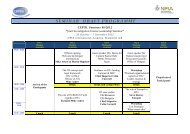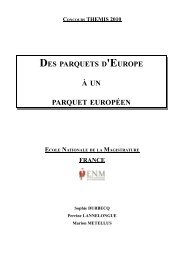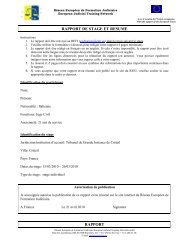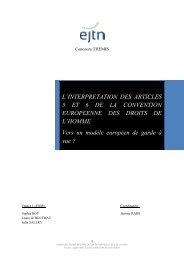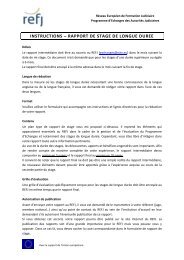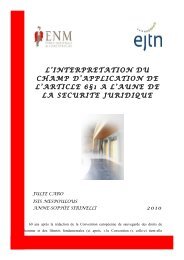Written paper Belgium_1.pdf - European Judicial Training Network
Written paper Belgium_1.pdf - European Judicial Training Network
Written paper Belgium_1.pdf - European Judicial Training Network
Create successful ePaper yourself
Turn your PDF publications into a flip-book with our unique Google optimized e-Paper software.
A. General introduction to the ethics of magistrates in <strong>Belgium</strong><br />
1.What is the difference between ethics and discipline?<br />
The ethics and discipline are traditionally linked. The discipline is 'the strong arm' of ethics in<br />
the sense that the discipline will sanction breaches of ethical standards. Where the ethics<br />
intervenes at the level between the magistrate and the litigant and therefore must take into<br />
account the public interest, discipline is more focused on the internal relationships within the<br />
judiciary as a whole and within the courts that are part of it in particular. The ethics is the<br />
totality of conduct , both written and unwritten, which constitute the professional obligations<br />
resting on those belonging to a particular profession and which relate to both their internal<br />
relationships as their relationship with a third party. The discipline is the instrument to<br />
maintain the internal cohesion (e.g. breaches of the hierarchy and collegiality) or the<br />
appearance to the outside (e.g. the degradation of the dignity of the profession) of the<br />
judiciary. 1<br />
Today in <strong>Belgium</strong>, and by extension in Europe, a change of mentality is going on. Previously,<br />
violations of ethical standards were only sanctioned when the internal cohesion between the<br />
members of the judiciary or the reputation of this order to the outside was affected. It was<br />
essentially corporatist and certainly not intended for the litigant. At present the ethics consist<br />
of positive rules of conduct, which the public confidence in the judiciary need to recover. The<br />
ethical rules are framed in what society would expect of the magistrate. Positive ethics. 2 The<br />
ethics leave the premises of the prohibition, and moves into the realm of the<br />
recommendations.<br />
The amended art. 404 of the Belgian judicial code is an example of this positive ethics. This<br />
article contains the general ethical standard to which the behavior of the magistrate should be<br />
compared, which although sounds rather vague and abstract 3 . By Act of July 7, 2002 a second<br />
member was attached to this article: “The disciplinary punishments provided in this chapter<br />
may also be imposed on those who neglect the duties of their profession and thus undermine<br />
1 DERIEMAECKER, X., LONDERS, G., 'Deontologie en tucht', in Statuut en deontologie van de magistraat,<br />
Brugge, Die Keure, 311-312<br />
2 LAMON, H., Een nieuwe deontologie voor magistraten?, Juristenkrant 2008, afl. 13, 17<br />
3 As will be proved later in the text, <strong>Belgium</strong> has a lot of written and unwritten deontological rules. The<br />
unwritten deontological rules are derived from art. 404 Judical code. They can be grouped around 4 standards,<br />
which will be explained later one in the text.<br />
4



